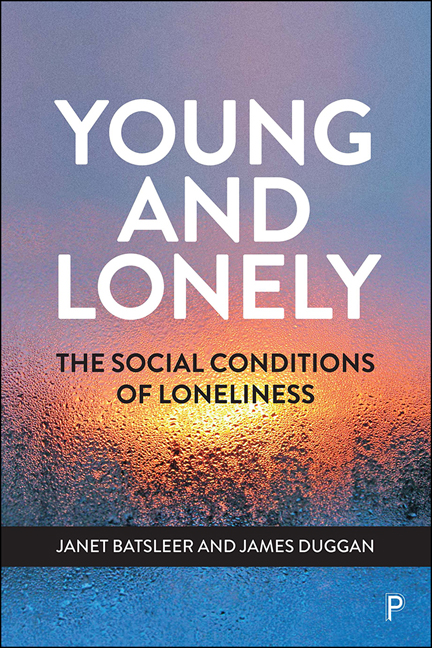Book contents
- Frontmatter
- Contents
- Notes on the Authors
- Acknowledgements
- Preface
- 1 Animate, Attune, Amplify
- 2 Finding Oneself a Loneliness Agenda
- 3 I’M New Here: Creating a New Research Project and A Young Person Led Research Agenda
- Part I The Social Conditions of Loneliness
- Part II The Experience of Loneliness
- Part III Building Friendship and Connection
- References
- Index
Part II - The Experience of Loneliness
Published online by Cambridge University Press: 18 March 2021
- Frontmatter
- Contents
- Notes on the Authors
- Acknowledgements
- Preface
- 1 Animate, Attune, Amplify
- 2 Finding Oneself a Loneliness Agenda
- 3 I’M New Here: Creating a New Research Project and A Young Person Led Research Agenda
- Part I The Social Conditions of Loneliness
- Part II The Experience of Loneliness
- Part III Building Friendship and Connection
- References
- Index
Summary
In March 2019, research conducted by YouGov for The Prince's Trust (2019) showed how unhappiness among young people had been increasing. In response to the statement ‘Life is really worth living’, the percentage of the poll who disagreed had doubled from 9 per cent to 18 per cent. One in five young people are said to experience loneliness. Four in 20 may not. It is not always clear which statistic is thought to be more serious. Loneliness as a pathology of solitude may, with good support and a caring community, turn out to be transient. An inability to experience loneliness and perhaps therefore an inability to recognise and empathise with this experience in others may be an equally serious and under-recognised pathology.
In the chapters that follow, we discuss what we learned during our study about young people's experience of loneliness. Beginning from what has been termed the ‘normative loneliness’ associated with transitions we present more fully some of the experiences of pain, grief and loss which seem to accompany loneliness, as well as some of the experiences of being singled out as not normal, as ‘different.’ In doing so, we draw extensively on thinking from a diverse range of feminist and queer thinkers. We draw on Judith Butler's discussion of the practices which produce norms, and their disruption. It is the case that the repeated rehearsal and citation of ideas of ‘normative transition’ itself reproduces an exclusionary norm which in turn intensifies loneliness. In responding to such exclusionary norms, much can be learned from the ‘trans+’ community and from the youth work developed there. Since the possibility of experiencing loneliness must be faced as an aspect of all transitions, the active work of creating community arises in response to such loneliness. A recognition of the exclusionary power of normativity paradoxically opens up a set of new spaces and practices for a new sense of community to come into being, founded in difference.
Also important in this section of the book are the discussion of shame and stigma and again we are indebted to Imogen Tyler's work here and that of other feminist scholars.
- Type
- Chapter
- Information
- Young and LonelyThe Social Conditions of Loneliness, pp. 71 - 72Publisher: Bristol University PressPrint publication year: 2020

